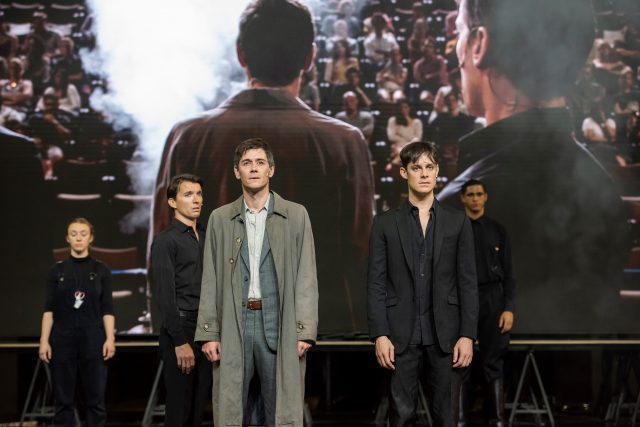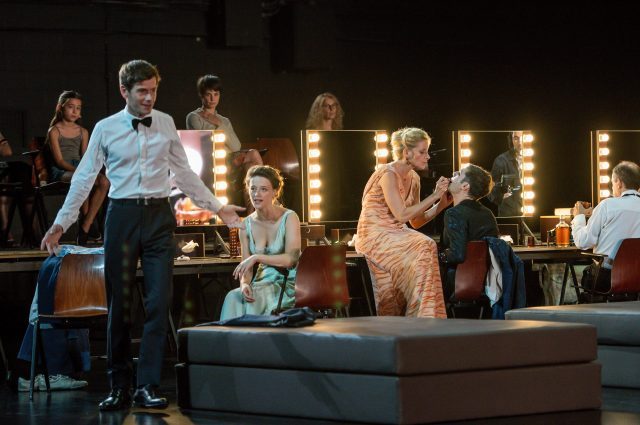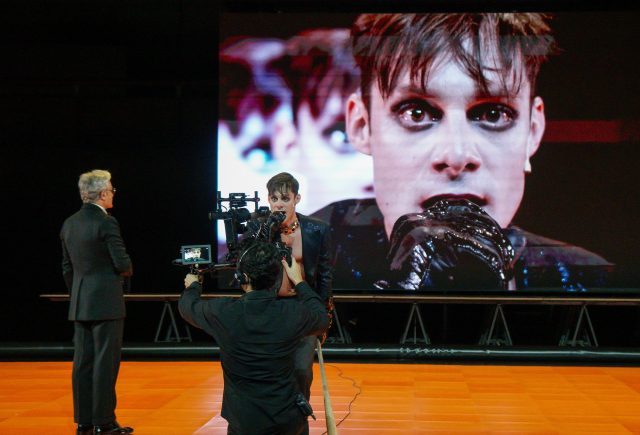
Ivo van Hove’s overwhelming theatrical version of The Damned runs at the Park Avenue Armory through July 28 (photo by Stephanie Berger)
Park Avenue Armory, Wade Thompson Drill Hall
643 Park Ave. at 67th St.
July 17-28, $35-$175, 7:30/8:00
212-933-5812
armoryonpark.org
When France’s legendary Comédie-Française invited innovative Belgian director Ivo van Hove to team up with the three-hundred-plus-year-old company for the prestigious Avignon Festival in 2016, he selected to adapt Luchino Visconti’s The Damned, the 1969 film about the demise of a wealthy steel clan during the rise of the Third Reich. The multimedia piece was presented prior to the election of Donald Trump as president of the United States as well as before Brexit and much of the fascistic movement taking hold around the globe, but it feels like it could have been written yesterday, particularly given Trump’s recent stand on steel and other tariffs. The spectacular production has triumphantly moved into the Park Avenue Armory’s massive Wade Thompson Drill Hall, where it immerses, confuses, delights, intrigues, captivates, and perplexes the audience over the course of 130 unpredictable minutes. In fact, afterward, when we were waiting for the bus on Lexington Avenue, an older woman approached us and, explaining that her two friends could not go at the last minute so she was alone, was desperate to discuss what we all had just seen, as she wasn’t sure whether she liked it but was deeply affected by it. Then, on the bus, as my wife and I talked more about the show, a younger woman sitting in front of us, also by herself, requested to join our conversation because she too wanted to know what we thought in order to help her navigate her own experience. Such reactions are not uncommon following works by van Hove, which are almost always fascinating and inventive whether they’re disappointing (Antigone, The Crucible), breathtaking (A View from the Bridge, Kings of War, Cries and Whispers), or somewhere in between (Lazarus).

Makeup tables are incorporated into the staging of The Damned with the Comédie-Française (photo by Stephanie Berger)
The audience sits in rising rafters in front of the large, impressive set, designed by van Hove’s longtime partner and collaborator, Jan Versweyveld, who also did the bold, brash lighting. At stage left are makeup tables and ottomans where characters occasionally change costumes (by An D’Huys) and speak directly into a live camera that projects the scene onto a giant screen at the back. At stage right is a row of wooden coffins where characters are led after they are dead. Tal Yarden’s projections also include archival footage of steel plants and fascism on the rise in Germany. The cast features Didier Sandre as family patriarch Baron Joachim von Essenbeck, who is preparing to choose his successor to save his business in light of the Third Reich’s power grab. In the mix are Joachim’s second son, Konstantin (Denis Podalydés); Konstantin’s son, Gunther (Clément Hervieu-Léger); Sophie (Elsa Lepoivre), the widow of Joachim’s eldest son, who is having an affair with Friedrich Bruckmann (Guillaume Gallienne); Joachim’s youngest son, the unstable Martin (Christophe Montenez); Joachim’s youngest daughter, Elisabeth (Adeline d’Hermy), who is married to Social Democrat Herbert Thallman (Loïc Corbery), with whom she has two girls, Erika (Madison Cluzel) and Thilde (Gioia Benenati); and family cousin Wolf von Aschenbach (Eric Génovese), who has joined the SS. The story is based on the Oscar-nominated screenplay by Visconti, Nicola Badalucco, and Enrico Medioli; although the film was in English, the play is in French and German, with English surtitles for the former. Sound designer Eric Sleichim’s wide-ranging original soundtrack was influenced by Bach, Strauss, Schütz, Buxtehude, and Rammstein, with music by saxophone quartet Bl!ndman.

Ivo van Hove’s The Damned takes on fascism in Nazi Germany following the burning of the Reichstag (photo by Stephanie Berger)
Despite many dazzling scenes, The Damned ends up being rather confounding. So much of it is ingenious, but too much of it is repetitive within the show itself as well as within van Hove’s oeuvre, meaning that newcomers to his work might leave much more blown away than his regular attendees. It’s a wholly impressive production, with compelling acting, well-orchestrated blood and gore, curious metaphorical meanderings, and live cameras that evoke Mario Mancini’s original cinematography. But the complex narrative and bevy of characters can get overwhelming, as can some of the spectacle. There’s a coldness that, even if it matches the soul of the film, is lacking something onstage. But despite all that, it is still a must-see, as is everything that van Hove does, whether with the Comédie-Française or his stellar home troupe, Toneelgroep Amsterdam.